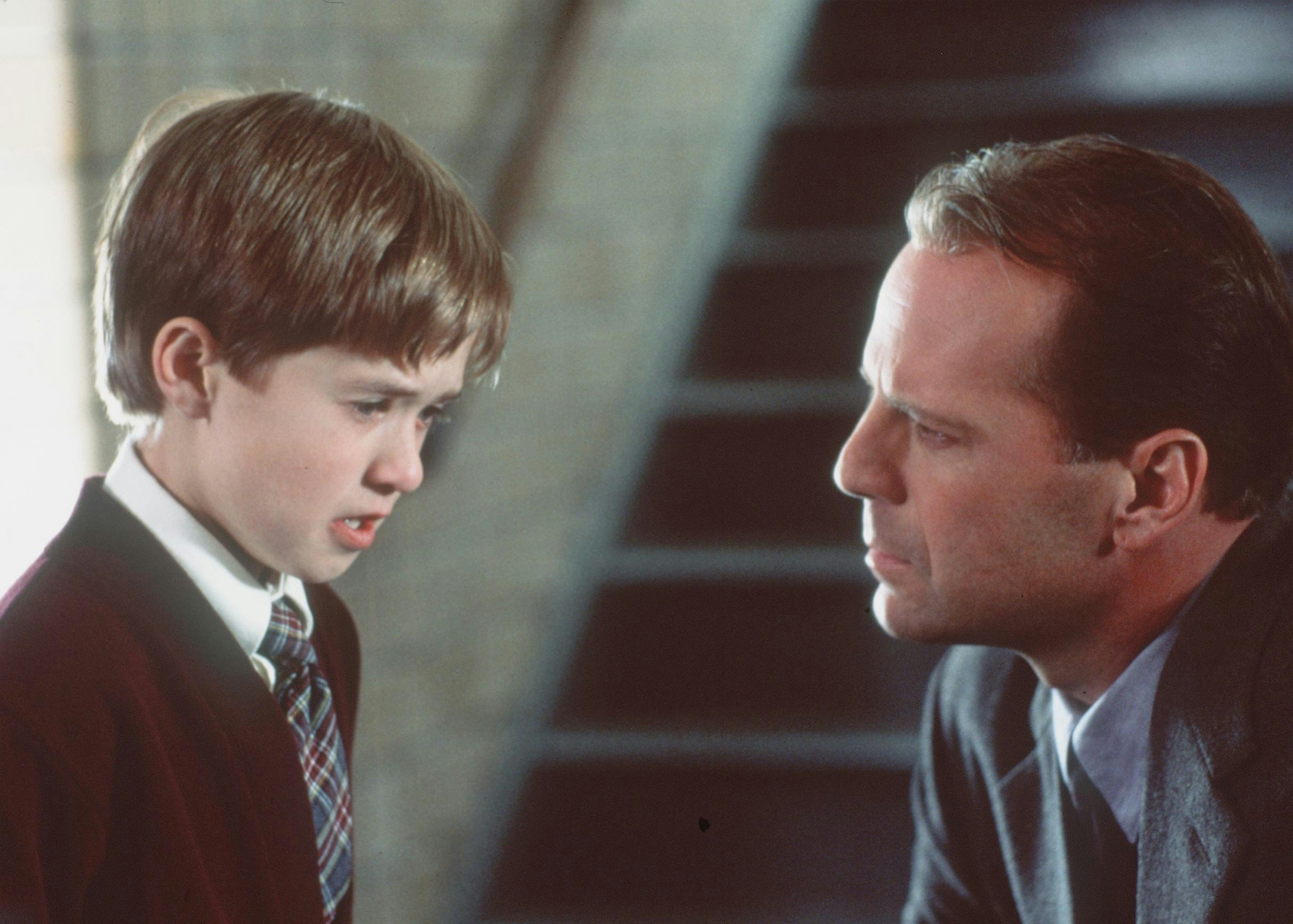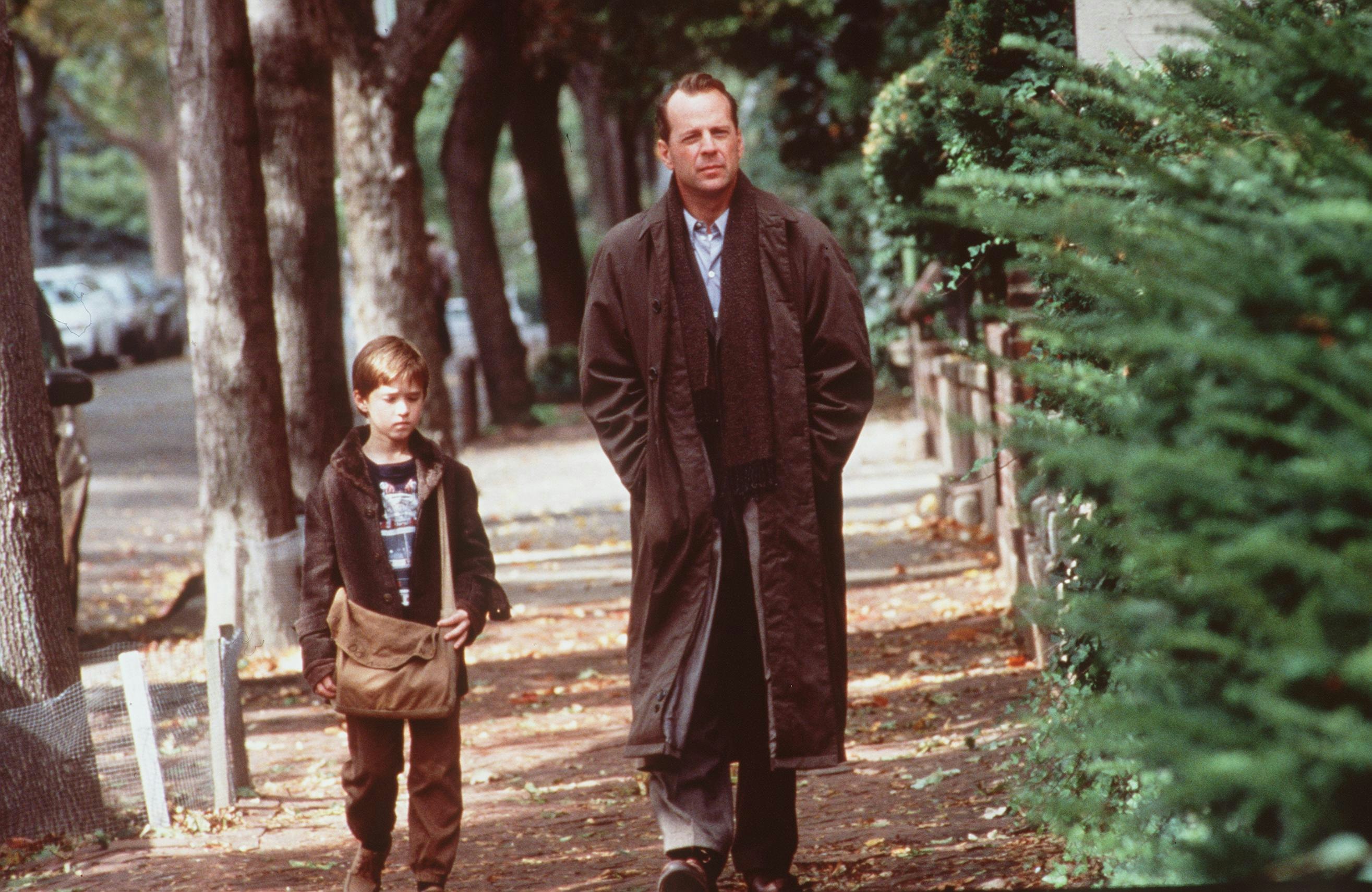
What kind of performance should you give when you know something huge that your character doesn’t? It’s not an uncommon problem for actors: nearly every scripted performance requires a degree of dramatic irony. An actor knows what their character will do next, what they’ll say next, what changes will force them to react and orientate themselves.
But in M. Night Shyamalan’s The Sixth Sense, released 25 years ago, Bruce Willis was faced with a uniquely structured journey — it’s not until the final minutes of the film that his character Dr. Malcolm Crowe realizes that the bullet wound given to him by a troubled former patient (Donnie Wahlberg) in the opening scene didn’t just wound him — it killed him. And everything he’s seen and done since has been as a ghost.
In The Sixth Sense, child psychologist Dr. Crowe is shot in front of his wife Anna (Olivia Williams), and presumably recovers. Months after the shooting, he has begun working with Cole Sear (Academy Award-nominee Haley Joel Osment), whose depression is a symptom of his ability to see ghosts with unfinished business wandering his home of Philadelphia.
Like Malcolm, Cole has an unsteady semi-assimilation with the normal world: he convinces his bully to pretend to be his friend to assuage his mother’s anxiety over his loneliness; after alarming his teachers with a drawing of a man being stabbed in the neck with a screwdriver, Cole makes sure to only draw stereotypically happy pictures. “They don’t have meetings about rainbows,” he tells his new psychologist.
Malcolm and Cole move past a sensitive but mannered doctor-patient dynamic to one of aching, fiercely felt loyalty — a natural change for two people who can only rely on each other in a distressing reality. The grown-ups Malcolm thinks he’s interacting with – his drifting wife Anna (Olivia Williams), Cole’s mother Lynn (Toni Collette) — are so consumed by the pain caused by their loved ones’ pain that Malcolm, whose work has shown him a lifetime worth of domestic strife, instinctively buys that these women want to retract into their own worlds, and he’s happy to not intrude.
Anna and Lynn’s detached, isolated demeanor is so familiar to Malcolm that he never realizes he's not actually sharing the same room as them, and rarely does anything to attract their attention. After Malcolm spots Anna in an amorous embrace with a younger employee, he smashes the glass door of her shop but storms off instead of confronting them. The feebleness of Malcolm’s attempt to get his wife to acknowledge him is largely for dramatic convenience (Malcolm can’t realize Anna can’t see him this early in the story) but it still reinforces how Malcolm has internalized how Anna treats him after being shot.

Willis, as well as every viewer who knows of the twist, knows that no adult acknowledges or talks to Malcolm because he no longer belongs to the land of the living. But believing that Malcolm is truly ignorant of his own mortality (and fatality) relies on Willis convincing us that this is someone who accepts nobody meeting his gaze and who tolerates never being spoken to. In Willis’ hands, the initial implausibility of Shyamalan’s most enduring surprising ending becomes one of the filmmaker’s greatest works of tragedy: Malcolm Crowe easily swallowed the loneliness of being a ghost because it made sense — he could live with it.
Willis’ knack for playing normal people in extraordinary circumstances is well documented and varied. The transformation of Die Hard’s John McClane from sarcastic husband in a marital spat to filth-caked avenger unfolds in steady increments so the character’s groundedness is always preserved. Even when he’s in full farce mode, such as the frantic, camera-mugging plastic surgeon Ernest in Death Becomes Her, Willis thrives off his character’s powerlessness, leaning into comic exasperation with razor-sharp comic instincts. But The Sixth Sense remains his finest performance because it reminds you just how soft-spoken he can be without losing presence or intensity. He gives voice to Shyamalan’s strange, evocative dialogue in such a warm and fragile undertone, and together with his muted expression and tired eyes, you’re struck by how comforting a trembling voice can sound, especially as it draws closer to a shuddering epiphany.
The Sixth Sense can be seen as a paranormal horror, a psychological thriller, or a particularly haunting and tragic ghost story, but it’s anchored by a performance that feels consistent with all three genre classifications. To Shyamalan, drama found in the boundaries between the living and the dead is at once scary, tense, and sad. The power of a protagonist like Malcolm Crowe is not that everything about him clicks into place when the twist is dropped, but that his twin states of ignorance and clarity have so much in common, and share a unified perspective on the world. It’s far too easy to live as ghosts to those around us, and we too readily accept being treated like we’re no longer alive. Bruce Willis shows us how in Malcolm’s voice, on his face, and across the shoulders of his musty overcoat.







